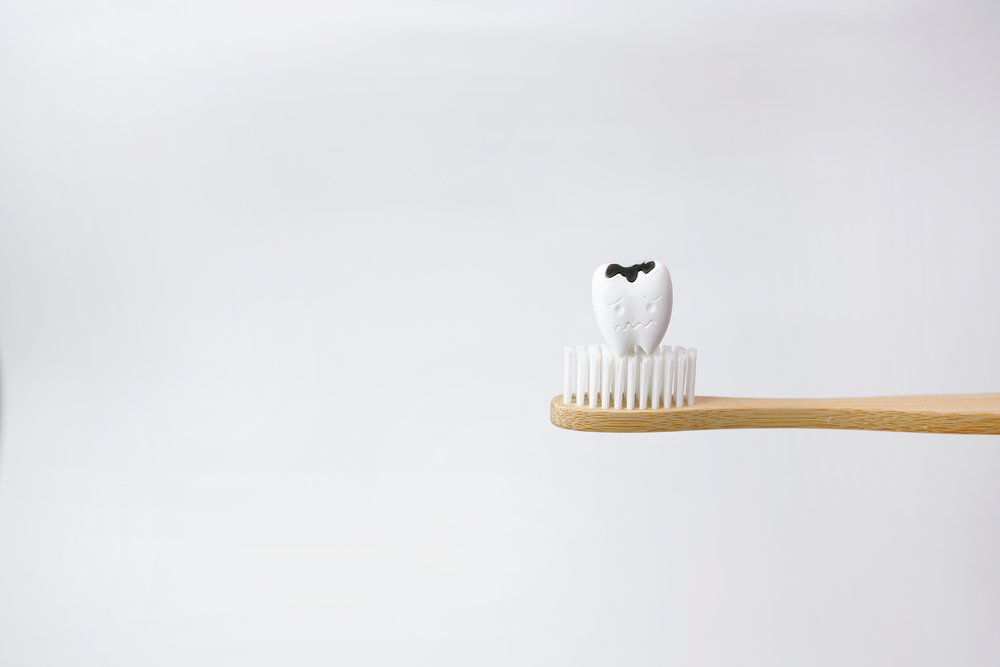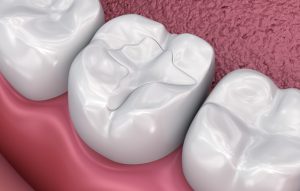

Don’t Let Cavities Overtake Your Oral Health
Picture this: You’re sitting at your friend’s dinner party, indulging in a delectable slice of chocolate cake, when suddenly you wince in pain. The sweet treat that should bring joy has revealed a hidden nightmare lurking within your mouth – a cavity. No one wants to experience this unexpected pain, and yet it remains one of the most prevalent dental issues worldwide.
That’s why our dentists have created the ultimate comprehensive guide on how to prevent and treat cavities — so you can enjoy delightful moments without agony. Say goodbye to surprise toothaches and hello to a healthy smile!
Cavities are permanently damaged areas on the hard surface of the teeth that develop into tiny openings or holes caused by a combination of bacteria, frequent snacking, sugary drinks, and poor oral hygiene. If cavities occur, treating them early on is essential to prevent further damage to the teeth and the need for more extensive treatments such as root canals or extractions.
What Are Cavities?
Cavities are one of the most common dental problems, affecting people of all ages and backgrounds. Cavities, also known as tooth decay or caries, damage your tooth’s enamel and lead to small openings on the hard surface of your teeth. These tiny openings can slowly develop into larger holes over time if they remain untreated.
Tooth enamel is the hard, outermost layer of our teeth that helps protect them from damage and harmful bacteria. Bacteria present in our mouth produce acid that breaks down this enamel, leading to cavities. The acid forms a sticky film called dental plaque that adheres to our teeth and causes decay. The bacteria in these layers produce more acid when we eat sugary foods or drink fizzy drinks.
Cavities can occur anywhere on your teeth but more commonly happen on your molars (back teeth), since it’s more difficult to reach those areas while brushing. As the decay progresses deeper into the tooth, you may experience sensitivity or pain when consuming something cold or hot.
To explain how a cavity forms, think of it like a hole drilled through a piece of wood. Just like wood gets eroded by pests due to dampness, our tooth enamel erodes due to bacteria generated by sugary food left on our teeth after eating.
Over time, these sugar deposits attract bacteria that produce acid every time we eat or drink something sugary — forming plaque on our teeth. The acids produce an attack and gradually break down the tooth’s enamel, leaving behind decayed areas resulting in what we know as cavities.
While some argue that good oral hygiene practices like brushing your teeth twice a day with fluoride toothpaste are enough to prevent cavities without cutting back on sugary intake, others believe that reducing sugar consumption and snacking habits are vital preventive measures to avoid tooth decay.
The Causes of Cavities
Although a mix of variables can lead to cavities, they all eventually stem back to plaque development. Some common causes of cavities include:
- Plaque Formation: Plaque builds up on our teeth when we don’t brush regularly or correctly. Items such as sugary drinks or food create an ideal environment for bacterial growth.
- Dry Mouth: Saliva helps prevent cavities by rinsing away food particles and neutralizing acids produced by bacteria. However, a dry mouth can occur for various reasons, such as medication, and may lead to less saliva, resulting in additional plaque accumulation.
- Frequent Snacking: Eating and drinking frequently throughout the day leaves more time for bacteria and acid production, leading to increased plaque formation.
- Poor Oral Hygiene Practices: Insufficient brushing or flossing habits leave behind food particles that lead to bacteria build-up and ultimately contribute to cavity formation.
- Genetics: While some people may inherently have stronger teeth than others, genetics do impact other dental health factors like tooth shape and spacing, which may increase the risk of developing cavities.
Symptoms of Cavities and Tooth Decay
If left untreated, cavities can lead to tooth decay and cause serious damage to your teeth. Some of the most common symptoms of cavities and tooth decay include:
- Toothache: A toothache is one of the most common signs of a cavity. It often starts as mild discomfort or sensitivity when eating or drinking hot, cold, sweet, or acidic foods. As the cavity progresses, pain may become more intense and persist even after the trigger’s been removed. Toothaches caused by cavities can be debilitating and require immediate attention from your dentist.
- Sensitivity: If you feel sudden sensitivity or pain in your teeth when drinking something cold or hot, it could be tooth decay. The sensitivity may be caused by an exposed nerve due to a cavity, which allows hot or cold temperatures to reach the pulp of the tooth.
- Visible Holes or Pits: Cavities look like small holes or pits in your teeth and may be visible on close inspection. They can develop on any surface of your teeth but most commonly occur on molars, since they have multiple grooves where food particles can accumulate. However, some cavities may not be visible during the early stages and might require X-rays for detection.
- Bad Breath: If you notice persistent bad breath despite brushing and flossing your teeth regularly, it could be a sign of tooth decay. Bacteria that cause cavities and decay produce a foul smell that can lead to bad breath.
Cavity Prevention Strategies
One of the most effective ways of preventing cavities is maintaining a healthy diet and practicing good oral hygiene. Limiting sugary foods and drinks reduces the amount of acid produced by bacteria in the mouth, leading to less risk of tooth decay. Brushing twice a day with fluoride toothpaste and flossing daily removes plaque buildup on your teeth, reducing your risk of cavities.
Fluoride is an essential mineral that helps strengthen tooth enamel, making it more resistant to decay. Using fluoride toothpaste and mouthwash keeps tooth enamel strong, reducing the risk of cavities.
Dental sealants are also a preventative measure that creates a barrier between teeth and bacteria that cause cavities. They’re thin coatings applied onto the grooves of back molars, making them an excellent option for people who are cavity-prone.
Incorporating cavity-fighting products into your routine can also help prevent cavities. Chewing sugar-free gum stimulates saliva production, which neutralizes the acid produced by bacteria in the mouth. Rinsing your mouth with a fluoride mouthwash can protect against tooth decay by strengthening your teeth and providing an additional layer of protection against plaque.
Regular dental check-ups help detect early signs of decay and prevent it from developing into cavities. Your dentist will be able to identify cavities during routine X-rays and provide guidance on preventative measures you can adopt to prevent further damage to your teeth.
Diet and Oral Hygiene
Maintaining good oral hygiene is essential in preventing cavities. Regular brushing and flossing, along with a healthy diet, are the first lines of defense against tooth decay. However, many people are unaware that their dietary choices can have a significant impact on oral health.
- Sugary or starchy foods such as candy, cookies, cakes, and soda can be particularly harmful to teeth, as they promote plaque formation. Plaque is a sticky film of bacteria that forms on teeth and feeds on sugars from the food and drinks we consume. This bacteria produces acids that erode tooth enamel, leading to the formation of cavities.
- Studies have shown that frequent snacking throughout the day promotes increased plaque buildup and acid production in the mouth. It’s better to consume sugary or starchy foods with meals rather than as snacks, since saliva production increases during mealtime and helps wash away food particles and neutralize acids.
- Foods rich in calcium, phosphorus, magnesium, vitamin D, and vitamin K2 play a crucial role in building strong teeth and promoting healthy gums. Calcium-rich dairy products like cheese, milk, and yogurt help rebuild lost enamel, while leafy vegetables like kale and spinach provide the necessary minerals for strong teeth.
- Crunchy fruits like apples and pears boost saliva production and neutralize harmful acids in the mouth. Nuts like almonds provide calcium and protein, which benefit the remineralization of teeth by increasing saliva flow.
- The use of tobacco products contributes heavily to cavities by reducing saliva production, which increases acid accumulation on teeth surfaces, leading to decay.
- Some sources believe bread and cereals being high in complex carbohydrates contribute to acid production, which wears enamel around the chewing surfaces of our molars, converting them into feeding grounds for bacterial growth.
 Role of Fluoride and Dental Sealants
Role of Fluoride and Dental Sealants
Fluoride is a naturally occurring mineral found in water sources and certain food items like fish, tea, oats, etc. Studies show that fluoride can strengthen tooth enamel, making teeth more resistant to tooth decay.
Most toothpaste brands contain fluoride, which, when used regularly, helps protect against cavity formation. Another way to get fluoride is by drinking fluoridated water or from mouthwashes containing fluorides.
Dental sealants are another option for cavity prevention. Sealants are thin layers of dental resin applied to the chewing surfaces of teeth, especially the molars and premolars, where plaque accumulates most often. They act as a barrier protecting teeth from harmful acids penetrating enamel upon contact, lowering the risk of decay by about 80%.
Some health conditions like dry mouth may increase your chances of developing cavities since the decreased saliva flow fails to clear sticky debris from tooth surfaces. Fluoride treatments prescribed at your dentist’s office help remineralize compromised enamel, aiding in cavity prevention with prolonged benefits.
Cavity Treatment Options
When it comes to treating cavities, there’s no one-size-fits-all solution, as the type of treatment depends on the extent and severity of the decay. However, it’s vital to address cavities promptly to prevent further damage to the tooth and avoid more invasive treatments like extractions or root canals.
One treatment option for cavities is filling the decayed area with a dental material such as composite resin or amalgam. The dentist will numb your mouth with a local anesthetic before removing the decayed portion of the tooth and then cleaning and filling the cavity with a chosen material. Fillings are relatively simple and affordable procedures that can be done in just one visit.
For more extensive cavities that have reached deep into the tooth, a dental crown may be necessary to restore its structure and function. The dentist will first remove the decayed portion of the tooth, take impressions of your teeth, and place a temporary crown while a permanent restoration is made. Once ready, the permanent crown is cemented onto the prepared tooth.
In severe cases where the decay has reached the pulp or nerve tissue of the tooth, root canal treatment may be suggested to prevent infection or abscesses from developing. This procedure involves removing the infected tissue inside the tooth, filling it with a special material, and placing a crown on top to protect it. While root canals can be more costly and time-consuming than fillings or crowns, they’re often necessary to save a severely damaged tooth.
Think of treating cavities like fixing potholes in roads — minor potholes can easily be filled with resinous materials, while deeper ones require excavation and repair of deeper layers. While some repairs are quick and inexpensive, others may require more extensive work but ultimately save you from future problems.
Home Remedies and Professional Care
One of the easiest things you can do to prevent cavities is to maintain good oral hygiene practices, such as brushing your teeth twice a day with fluoride toothpaste and flossing at least once a day. This helps remove food particles that bacteria feed on to cause enamel erosion. Additionally, regularly using mouthwash can help control bacterial growth in the mouth.
Another preventative measure is maintaining a healthy diet low in sugar and acidic foods and drinks. Natural foods like fresh fruits and vegetables can help stimulate saliva production, which neutralizes acids produced by plaque bacteria. Sugary beverages, like soda or sports drinks, should be consumed in moderation as they contribute to tooth decay.
For those who suffer from mild tooth decay, several at-home remedies can provide relief. Over-the-counter fluoride gels, rinses, or toothpaste can help remineralize weakened enamel and prevent further damage. However, it’s important to note that these products shouldn’t replace professional treatment for advanced cases of decay.
Importance of Regular Dental Check-ups
Regular dental check-ups are crucial for maintaining good oral health and preventing cavities. It’s recommended that individuals visit their dentist at least twice a year to receive professional teeth cleanings and check-ups. During these appointments, dentists can identify potential problems early on and take necessary measures to prevent them from escalating.

Aside from cavity detection, regular check-ups also provide opportunities for dentists to screen for other oral health issues such as gum disease, oral cancer, and jaw problems. These conditions can often go unnoticed by patients until they escalate into more serious problems such as tooth loss or bone damage.
There are also some preventative measures that dentists can take during regular check-ups that help reduce the risk of developing tooth decay and cavities. For instance, dentists might apply dental sealants or fluoride treatments on your teeth to strengthen tooth enamel and prevent tooth decay.
Some people fear going to the dentist for different reasons ranging from costs to the fear of pain. However, avoiding preventive dental care may cause more harm than good for your teeth and gums. Neglecting regular dental visits may only worsen any existing issues with your teeth or gums, which could lead to more extensive treatments and procedures that are more expensive, invasive, and painful.
Imagine having a cavity that’s left unchecked for too long. Initially, you might not experience any pain or discomfort. As the cavity progresses, it may cause pain and sensitivity whenever you bite or chew food. Eventually, it may spread deep into your tooth, causing an infection that extends down your tooth root, making it necessary for you to receive root canal therapy.
The importance of regular dental check-ups can’t be overstated. By visiting your dentist every six months, you can detect cavities and other oral health problems early on before they escalate into more severe conditions. Don’t wait until it’s too late, make an appointment with your dentist today!
Frequently Asked Questions
Can cavities impact other parts of the body besides teeth?
Yes, cavities can impact other parts of the body besides teeth. The bacteria that cause cavities can enter the bloodstream and spread to other organs, leading to various health problems. Studies have linked untreated cavities to an increased risk of heart disease, stroke, respiratory infections, and even dementia.
Bacteria from untreated cavities can also travel to the lungs through breathing or aspiration, causing respiratory infections like pneumonia.
How common are cavities among adults versus children?
Cavities are a prevalent dental problem that affects individuals of all ages. However, studies indicate that cavities are more common in children than in adults. While cavities in primary teeth can be concerning, cavities don’t disappear once children transition to permanent teeth. Studies show that over 90% of adults suffer from cavities, making it one of the most common chronic dental diseases around the world.
Schedule Your Next Dental Appointment!
Don’t wait any longer to visit the dentist. Schedule your next dental appointment today to ensure that your oral health is in excellent condition.



 Role of Fluoride and Dental Sealants
Role of Fluoride and Dental Sealants